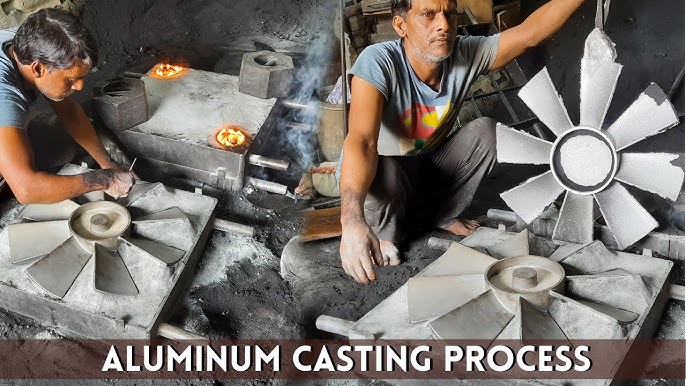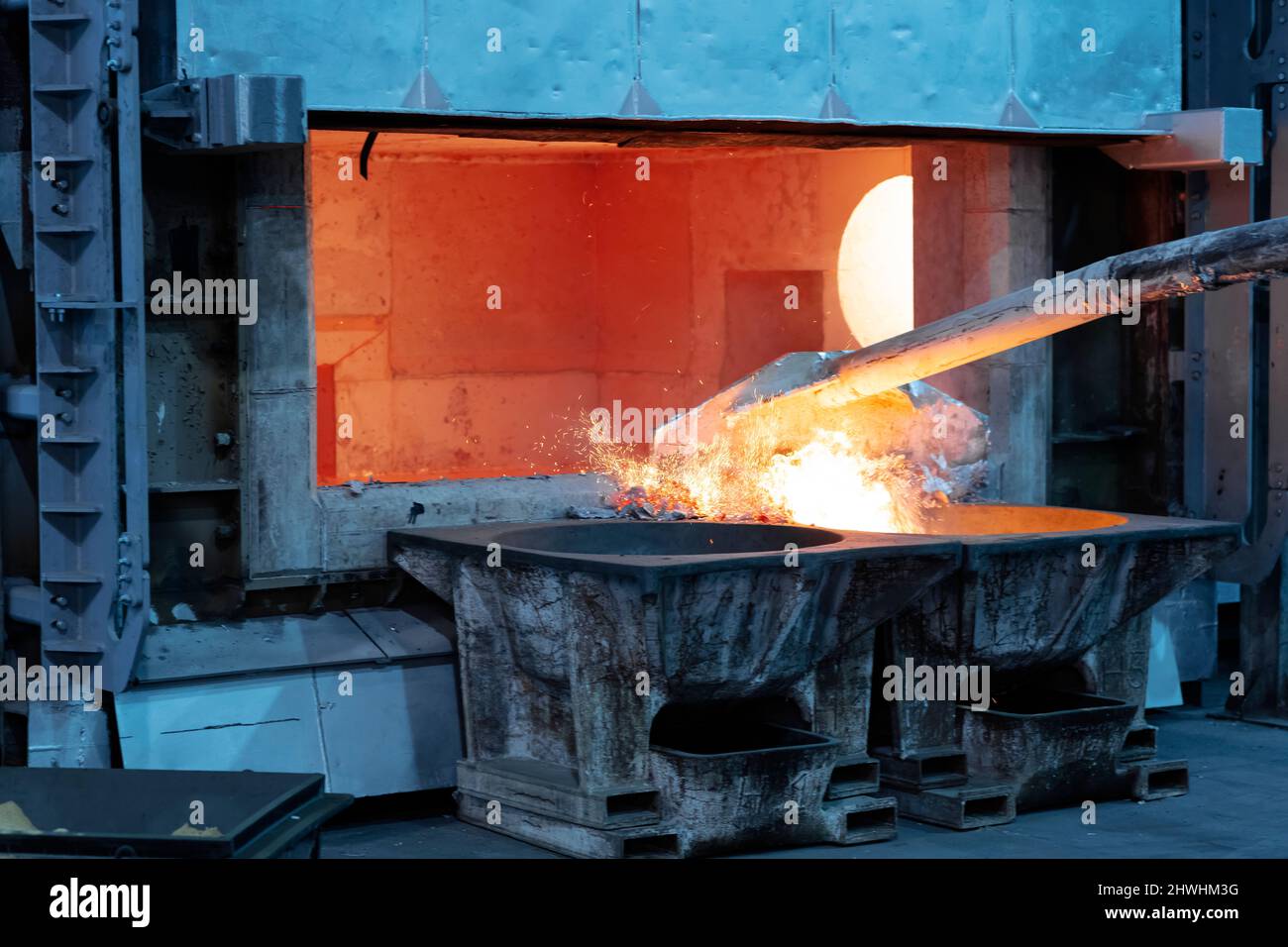Comprehending the Conveniences and Innovations in the Aluminum Foundry Sector
The Aluminum Foundry industry plays a vital duty in modern manufacturing. Its lightweight properties notably improve gas effectiveness, specifically in aerospace and automotive fields. On top of that, Aluminum's resistance to corrosion guarantees longevity in different applications. As the market advances, developments such as advanced recycling and additive production are improving manufacturing approaches. Discovering these advancements reveals not only the benefits but also the challenges ahead for Aluminum foundries in a swiftly altering market.
The Lightweight Advantage of Aluminum
Aluminum's light-weight nature offers significant benefits throughout numerous markets, especially in manufacturing and transportation. Its low density enables for the production of components that are much easier to manage and set up, resulting in reduced labor prices and boosted effectiveness. In the automobile sector, lighter vehicles add to enhanced fuel economy and reduced discharges, aligning with international sustainability objectives. In aerospace, the use of Aluminum minimizes the overall weight of airplane, which is vital for enhancing efficiency and reducing functional costs.
In addition, Aluminum's lightweight homes facilitate ingenious designs that were previously impossible with much heavier products. This flexibility makes it possible for producers to develop complex forms and frameworks while preserving architectural integrity. Generally, the light-weight advantage of Aluminum not just enhances product efficiency yet likewise drives advancements in modern technology and design, making it a recommended material in different applications.
Deterioration Resistance and Longevity
The Aluminum Foundry market is renowned for creating products with superior corrosion resistance, making them suitable for various applications. This building, combined with enhanced structural honesty, adds to the long-lasting performance benefits that Aluminum parts offer. Therefore, industries significantly rely upon Aluminum to satisfy demanding ecological conditions without endangering quality.
Superior Deterioration Resistance
While various metals face significant difficulties from environmental aspects, Aluminum attracts attention for its superior rust resistance, making it a favored selection in several applications. This residential or commercial property is mostly because of an all-natural oxide layer that bases on the Aluminum surface, offering a barrier against moisture and corrosive representatives. Unlike various other steels that may rust or weaken in time, Aluminum preserves its honesty also in severe environments, such as commercial setups or coastal areas. Additionally, its light-weight nature incorporated with rust resistance makes it optimal for applications in aerospace, automobile, and marine sectors. Generally, Aluminum's exceptional durability not just boosts product longevity yet additionally decreases maintenance prices, offering a compelling benefit for consumers and suppliers alike.
Boosted Structural Integrity
Designers and designers increasingly recognize the value of improved architectural stability in modern applications, where both deterioration resistance and toughness are important. Aluminum alloys, understood for their light-weight properties, likewise exhibit phenomenal resistance to deterioration, making them suitable for rough settings. The ingenious techniques utilized in the Aluminum Foundry industry add considerably to producing parts with boosted longevity. Advanced casting procedures and alloy make-ups are customized to meet certain performance demands, making certain that structures can stand up to extreme conditions without jeopardizing honesty. Surface area therapies and coatings improve the life-span of Aluminum products, additionally mitigating damage over time. This concentrate on boosted architectural integrity not only extends the use of products however additionally reduces upkeep expenses, solidifying Aluminum's placement as a product of choice in numerous markets.
Resilient Performance Benefits
Durable performance in Aluminum elements is largely associated to their superior rust resistance and resilience. Unlike lots of metals, Aluminum naturally forms a protective oxide layer, which avoids corrosion and damage in numerous environments, consisting of industrial and aquatic setups. This fundamental residential or commercial property considerably extends the life-span of Aluminum items, reducing upkeep and substitute prices. Furthermore, the lightweight nature of Aluminum boosts its applicability across sectors without compromising stamina. The product's resistance to deterioration also adds to its dependability sought after applications, making it a suitable choice for automobile, aerospace, and building fields. As industries significantly focus on sustainability and longevity, Aluminum's performance advantages line up with modern-day engineering demands, solidifying its role in cutting-edge manufacturing procedures.
Environmental Influence and Sustainability
 As the Aluminum Foundry market evolves, it significantly prioritizes ecological impact and sustainability, acknowledging the demand for responsible methods despite environment change. Efforts to decrease waste and energy intake go to the forefront, with several foundries embracing recycling initiatives to redeem Aluminum scrap. This not only decreases resources use but likewise significantly reduces power expense, as recycled Aluminum requires only a fraction of the energy contrasted to key manufacturing.
As the Aluminum Foundry market evolves, it significantly prioritizes ecological impact and sustainability, acknowledging the demand for responsible methods despite environment change. Efforts to decrease waste and energy intake go to the forefront, with several foundries embracing recycling initiatives to redeem Aluminum scrap. This not only decreases resources use but likewise significantly reduces power expense, as recycled Aluminum requires only a fraction of the energy contrasted to key manufacturing.Advancements in emissions control innovations are being applied to lower air pollutants, aligning procedures with more stringent environmental policies. Factories are likewise checking out alternate energy sources, such as solar and wind, to power their facilities sustainably. By fostering collaboration with stakeholders, the industry intends to develop innovative solutions that enhance ecological stewardship. Jointly, these initiatives highlight a dedication to minimizing the Aluminum Foundry's carbon impact while advertising a circular economic situation within the manufacturing field.
Advanced Production Techniques
 Transforming production procedures, the Aluminum Foundry industry is progressively integrating sophisticated production strategies to boost performance and accuracy. Methods such as computer numerical control (CNC) machining and additive manufacturing have become necessary components in maximizing production process. CNC machining enables for high-precision element construction, considerably reducing material waste and manufacturing time. Additive production opens up new avenues for complex geometries and light-weight layouts that were previously difficult to attain.
Transforming production procedures, the Aluminum Foundry industry is progressively integrating sophisticated production strategies to boost performance and accuracy. Methods such as computer numerical control (CNC) machining and additive manufacturing have become necessary components in maximizing production process. CNC machining enables for high-precision element construction, considerably reducing material waste and manufacturing time. Additive production opens up new avenues for complex geometries and light-weight layouts that were previously difficult to attain.In addition, the implementation of automation and robotics in Aluminum factories enhances procedures, lessens human error, and improves employee safety and security. These innovations assist in an even more responsive manufacturing atmosphere, making it possible for manufacturers to adapt swiftly to market needs. The integration of advanced simulation software program even more boosts the design and testing phases, leading to remarkable item top quality. Jointly, these techniques not only enhance functional effectiveness yet likewise foster technology, placing the Aluminum Foundry sector at the leading edge of contemporary production.
Innovations in Recycling Procedures
The Aluminum Foundry industry is not just progressing in producing techniques but is also making substantial strides in reusing procedures. Advancements are emerging to enhance the efficiency of reusing techniques, decreasing energy intake and enhancing sustainability. Advanced sorting technologies, such as computerized optical sorting, allow the identification and separation of Aluminum from other products with high accuracy. This causes a better hop over to these guys of recycled Aluminum, which is crucial for preserving the stability of the final items.
Additionally, closed-loop recycling systems are being executed, permitting suppliers to reuse Aluminum scrap within their very own manufacturing processes. This reduces waste and promotes a circular economy. In addition, research study right into new recycling strategies, such as hydrometallurgical processes, supplies the capacity for recouping Aluminum from complicated waste streams. These innovations not just add to reducing the carbon footprint of the Aluminum Foundry sector however additionally reinforce its financial stability in a progressively environmentally mindful market.
Applications Across Different Industries
Countless industries are progressively identifying the flexibility and advantages of Aluminum Foundry items, resulting in prevalent applications throughout industries such as auto, aerospace, construction, and customer goods. In the vehicle sector, Aluminum castings contribute to lightweight lorry layouts, enhancing fuel performance and performance. Aerospace producers make use of Aluminum components for their strength-to-weight ratio, important for airplane structures and parts.
In construction, Aluminum is favored for its durability and resistance to rust, making it suitable for window frameworks, roof, and structural assistances. Customer items additionally gain from Aluminum Foundry items, as seen in kitchenware, electronics, and packaging, where lightweight and recyclable materials are vital.
The adaptability of Aluminum Foundry techniques allows for intricate layouts and precise requirements, dealing with the diverse needs of these sectors. As an outcome, Aluminum Foundry products are becoming essential to modern production procedures throughout different industries.
Future Trends in Aluminum Foundries
As industries remain to evolve, Aluminum foundries are positioned to accept a number of vital trends that guarantee to boost performance and sustainability. One noticeable trend is the raising fostering of digital innovations, including automation and synthetic intelligence, which simplify operations and improve top quality control. Additionally, the push towards sustainable practices is leading foundries to spend in reusing modern technologies, considerably minimizing waste and power intake.
 Another arising fad is using advanced alloys and products, satisfying the growing need for lightweight and sturdy components across numerous sectors (Aluminum Foundry). The assimilation of additive manufacturing methods is prepared for to reinvent part layout, providing personalization and decreasing lead times.
Another arising fad is using advanced alloys and products, satisfying the growing need for lightweight and sturdy components across numerous sectors (Aluminum Foundry). The assimilation of additive manufacturing methods is prepared for to reinvent part layout, providing personalization and decreasing lead times.Cooperation with research institutions is additionally expected to drive technology, as shops look for to develop new procedures and materials. Aluminum Foundry. Collectively, these patterns see here now show a transformative future for the Aluminum Foundry market, lining up with broader goals of sustainability and efficiency
Frequently Asked Inquiries
What Are the Normal Prices Connected With Aluminum Foundry Production?
The typical prices associated with Aluminum Foundry manufacturing consist of basic materials, labor, power, equipment maintenance, and overhead costs. These factors collectively influence the total financial investment required for efficient Aluminum spreading operations.
Exactly How Does Aluminum Compare to Other Steels in Strength?
Aluminum, while lighter than several metals, exhibits remarkable strength-to-weight ratios. Compared to steel, Aluminum is less solid but offers outstanding corrosion resistance, making it a favorable choice in applications where weight and sturdiness are necessary.
What Precaution Are in Place in Aluminum Foundries?
Precaution in Aluminum factories usually include mandatory individual safety equipment, air flow systems to regulate fumes, routine equipment upkeep, training programs for employees, and adherence to rigorous security policies to reduce risks connected with liquified metal handling.
Exactly How Is Quality Control Managed in Aluminum Spreading Processes?
Quality assurance in Aluminum casting processes entails you could try here extensive inspections at different phases, including basic material assessment, procedure monitoring, and end product testing. Methods such as statistical procedure control and non-destructive screening assurance adherence to sector standards.
What Accreditations Are Very Important for Aluminum Foundry Suppliers?
The value of qualifications for Aluminum Foundry providers consists of ISO 9001 for high quality administration, ISO 14001 for ecological management, and industry-specific requirements like ASTM and SAE, ensuring compliance, safety and security, and reliability in producing procedures.
The Aluminum Foundry market plays a necessary role in contemporary production. The Aluminum Foundry industry is renowned for creating materials with premium rust resistance, making them excellent for various applications. Reinventing manufacturing procedures, the Aluminum Foundry industry is progressively incorporating advanced manufacturing techniques to improve performance and accuracy. The Aluminum Foundry sector is not just progressing in manufacturing methods however is likewise making considerable strides in reusing processes. As markets continue to progress, Aluminum shops are positioned to welcome numerous vital trends that promise to enhance efficiency and sustainability.